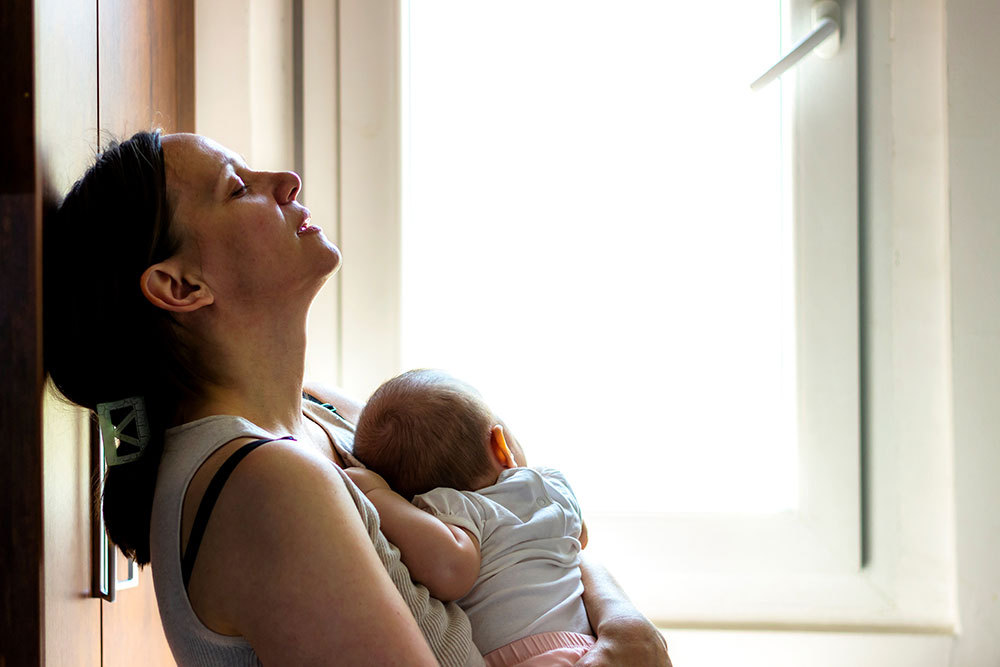Postpartum Depression: You Are Not Alone

While difficult, postpartum depression is a condition that affects many mothers and often strikes without warning. Learn about the red flags to look out for, and most importantly, how to get help.
Medical Experts: Courtney Glickman, PhD; Jill Purdie, MD
After Courtney Glickman, PhD gave birth to her first child in 2018, she knew something was wrong. “I felt very overwhelmed and had a lot of excessive worrying and fears that I wasn’t a good mother and about my son’s safety and well-being,” she says. She also had crying spells, felt helpless, was irritable towards her spouse, and had difficulty sleeping.
At first, she tried to convince herself it was just the baby blues, which often appear within the first two to three days after delivery and can last up to two weeks. But her symptoms were severe and lasted longer than she expected. “I felt ashamed and I felt alone, so I kept it a secret,” she says.
As a mental health therapist and founder of The Collective Healing Center in Annapolis, Maryland, Dr. Glickman knew her symptoms were something more than fluctuating hormone levels and mood swings: postpartum depression.
According to the Centers for Disease Control and Prevention (CDC), one in eight women experiences postpartum depression (PPD). Celebrities including Adele, Serena Williams, Chrissy Teigen, Cardi B, and Drew Barrymore have been open about their own struggles with the condition as new mothers.
Still, whether due to feelings of guilt, stigma, or embarrassment, many women with PPD feel they’re alone.
For Dr. Glickman, “there was this added layer of stigma associated with the fact that I’m a therapist and was struggling with my own mental health,” she says. Since she frequently works with clients who have PPD, she knew the coping strategies and thought she could get through it on her own. However, she soon realized she needed to do what she’s long advised other women do: Speak up and get help.
Beyond the Baby Blues
Although the birth of a baby is an exciting life event, many women experience sadness, anxiousness, or frustration after pregnancy. Experts think these may be side effects of the rapid drop in hormones and the emotional and psychological changes that go along with having a new baby, says Jill Purdie, MD, medical director, and OB/GYN at Northside Women’s Specialists, part of Pediatrix Medical Group in Atlanta, Georgia.
The baby blues typically happen within a few days or so of the postpartum period and usually go away after a week or two. PPD symptoms are more intense and last longer. They usually start during the first few weeks after childbirth but can occur through the first year after having a baby. At your six-week postpartum checkup, you’ll likely receive a depression screening from your doctor that helps gauge your risk of depression. While these tools can be helpful, they require your full transparency to be effective. Know that your provider is there to help you, and try not to mask any true feelings or concerns.
Women with PPD may experience the following symptoms:
- Persistent feelings of sadness, hopelessness, worthlessness, anxiousness, or guilt
- Feeling empty
- Irritability
- Crying all the time or for no reason
- Loss of interest in hobbies and activities once enjoyed
- Difficulty concentrating or making decisions
- Abnormal changes in appetite or weight (or both)
- Trouble sleeping or wanting to sleep all the time
- Difficulty bonding with your baby or lack of interest in your baby
- Thoughts of suicide or hurting yourself or your baby
Rarely, some women experience postpartum psychosis, a severe mental illness that occurs after childbirth. If you experience hallucinations, delusions, paranoia, or confusion, call 911 or go to the ER immediately. Women with postpartum psychosis may be at risk of hurting themselves or their child.
You Are Not to Blame
Any mother, regardless of age, race, financial status or education level, can develop PPD. It doesn’t matter if it’s her first baby or the fifth. Certain factors, however, do put some women at increased risk of depression. For instance, Dr. Glickman had suffered a previous pregnancy loss, she used fertility treatments to conceive and she had a traumatic childbirth experience with her son, all of which she thinks may have contributed to her PPD.
Other risk factors include personal or family history of depression or bipolar disorder, depressive disorder during pregnancy, a baby with health problems or other special needs, a weak support system, and relationship or financial problems.
That said, there’s no way to prevent PPD. So if you experience it, know it’s not your fault and doesn’t mean you did anything to cause it.
The Road to Recovery
Treatment for PPD is therapy, medication, or a combination of both. With therapy, also known as “talk therapy,” you’ll discuss your feelings with a mental health professional and learn strategies to challenge some of the irrational beliefs and negative thoughts you may be experiencing, says Dr. Glickman.
Prescription antidepressant medications reduce postpartum depression symptoms by balancing the chemicals in your brain. “As with all medications, talk with your health care provider about the risks versus benefits of being on the medication while pregnant or breastfeeding,” says Dr. Purdie.
You may think it’s better to avoid the meds altogether. However, untreated depression or anxiety during pregnancy can cause preterm birth or low birth weight, says Dr. Purdie. Also, untreated PPD can affect your ability to parent your child properly and it can cause language delays, behavior problems and other issues during your baby’s childhood.
In addition to therapy and medication, these other steps may help improve your mental state.
Manage your expectations
Get rid of the idea that your baby will seldomly cry and you’ll be Super Mom. Having unrealistic expectations sets you up for disappointment. Instead, realize there will be times when your little one is super cranky and you’re covered in vomit and want to scream. It’s OK!
Get sleep
Yes, it’s tough when you have a newborn depending on you 24/7. However, when your baby goes down for slumber, do the same. Fatigue will worsen your mood.
Ask for help
Don’t try to do it all on your own. “Reach out to your family members, friends, and other loved ones around you for support,” says Dr. Purdie. It’s perfectly fine to ask your sister to come over and watch the baby so you can take an uninterrupted, cry-free shower.
Work up a sweat
Dr. Purdie says exercise helps many new moms manage PPD symptoms. A short walk while pushing your infant in the stroller or a quiet yoga session while your baby’s in the crib can help your body release feel-good hormones.
Look for group support
Sharing your feelings, getting advice, or simply being in a space with people who can relate can help you feel better. Dr. Glickman joined an emotional support group to help her manage her PPD. Try a local or online moms’ group or one of the many groups available through Postpartum Support International.
Have patience
Even with therapy or medication, it can take some time before you feel like your old self again, says Dr. Glickman. Now the mother of two, she says it’s important to be patient and show yourself some compassion. When you have doubts, know this: You’re doing what’s best for you and your baby, which makes you a good mother!







